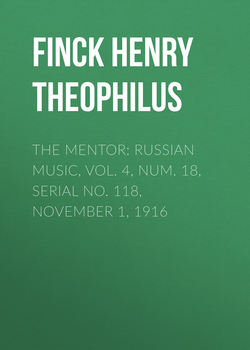Читать книгу The Mentor: Russian Music, Vol. 4, Num. 18, Serial No. 118, November 1, 1916 - Finck Henry Theophilus - Страница 3
RUSSIAN MUSIC
Anton Rubinstein
ОглавлениеTWO
There has been a curious uncertainty as to the date of Anton Rubinstein’s birth. He was born on November 28, 1829, but due to a lapse of memory on the part of his mother, he always celebrated his birthday on the 30th of November. He was the son of a Jewish pencil manufacturer at Wechwotynetz, Russia, who later went to Moscow. In his autobiography Rubinstein tells of this migration: “My earliest recollections are of a journey to Moscow in a roomy covered wagon, undertaken by the three families, with all the children and servants, – nothing less than a tribal migration. We reached the city and crossed the Pokròvski bridge. Here we hired a large house belonging to a certain Madame Pozniakòv; it was surrounded by trees and stood near a pond beyond the river Iowza. This was in 1834 and 1835.”
The mother of Rubinstein was an excellent musician, and she gave the young boy his first music lessons. In addition he had as a teacher a master of the piano named Alexander Villoing. To the end of his life Rubinstein declared that he had never met a better master.
When he was only ten years old Rubinstein made his first public appearance as a performer, playing in a theater at Moscow. Two years later he went to Paris, and roused the admiration of Liszt and Chopin by his playing.
After this Rubinstein traveled for some time in Holland, Germany and Scandinavia. In 1842 he reached England, where he made his first appearance, on May 20th. He made a brief visit to Moscow in 1843, and two years later went with his family to Berlin, in order to finish his musical education. There he made friends with Mendelssohn.
Then Rubinstein’s father died suddenly. His mother and brother were forced to return to Moscow. Anton went to Vienna to earn a living. For nearly two years more he studied hard there, and then went on two concert tours through Hungary. The Revolution broke out in Vienna and prevented his return to that city, so he went to Petrograd, where he studied, composed and lived pleasantly for the next few years.
About this time he came near being exiled to Siberia through an unfortunate error of the police. He was saved from this by his patroness, the Grand Duchess Helene.
He composed several operas during the next few years; and he visited Hamburg and Leipzig and then went on to London, arriving there for the second time in 1857. He remained there for a short time and reappeared the following year, in the meantime having been appointed concert director of the Royal Russian Musical Society. In 1862 he helped to found the Conservatory at Petrograd. Of this he was director until 1867.
Rubinstein then traveled for some years, visiting America in 1872 – a tour which brought him $40,000. So popular was his playing that he was afterward offered $125,000 for fifty concerts; but he could not overcome his dread of the sea voyage. He returned to Russia from America, and after a short rest continued his concert tours. For the remaining years of his life he lived in turn at Petrograd, Berlin, and Dresden, devoting his time to concerts, teaching, and to composition. In 1885 he began a series of historical recitals, which he gave in most of the chief European capitals. Rubinstein died near Petrograd on November 20, 1894.
